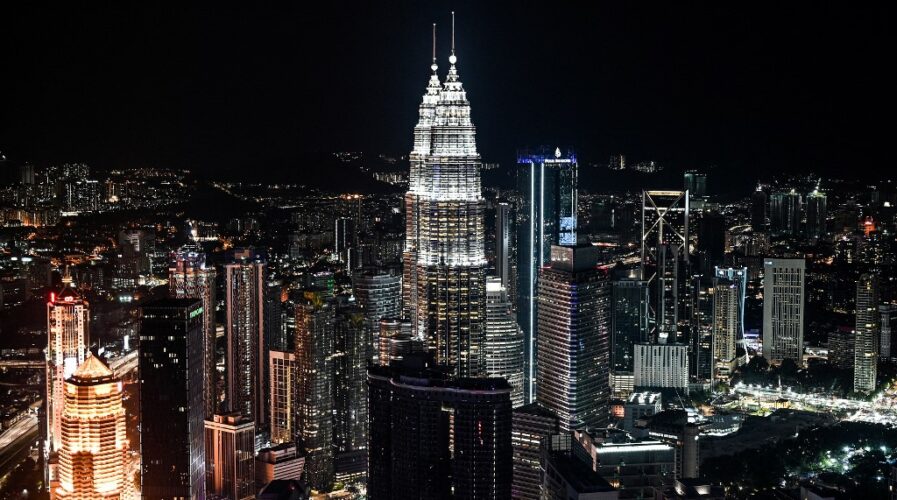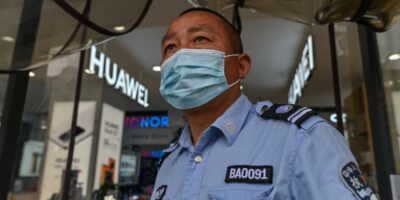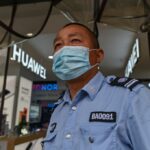
As Malaysia’s 5G plans move forward, critics have questioned the allocation of billions of Ringgit to a single operator. (Photo by Mohd RASFAN / AFP)
Ericsson’s Malaysia 5G bid cheaper than competitors, says DNB
Digital Nasional Berhad (DNB), a special purpose vehicle (SPV) under the Malaysian Ministry of Finance, has released a statement last Thursday clarifying details of the Malaysia 5G tender awarded to Ericsson.
DNB stated that Ericsson’s estimated cost of RM 11 billion for the design, build, and maintenance of the national Malaysia 5G network is “around RM 700 million lower” than the next closest bid.
Ericsson’s estimated costs of RM 4 billion for network equipment, deployment services, ongoing maintenance, and network management were the lowest out of all the four bidders.
DNB stated that the remaining RM 7 billion would go towards covering network infrastructure costs from “other parties comprising primarily tower rental and fiber leasing over a 10-year period”.
Of these aforementioned parties, over 60% of the RM 7 billion will “directly benefit Bumiputera interest in the telecommunications industry and Bumiputera contractors”.
Foreign and domestic financial institutions will be sourced to finance network equipment, which will be undertaken by Ericsson, as part of the agreement to supply, deliver and manage the entire 5G network.
The Malaysia 5G tender process
According to the statement, the process was structured by an independent professional services firm, Ernst & Young Consulting Sdn. Bhd. (EY Consulting).
This was based on global standards and involved four panels of experts. These panels comprise some 50 local and international experts from across 10 countries that have current 5G network rollout experience.
According to DNB, out of 14 evaluated Network Equipment Providers (NEPs), eight were shortlisted and invited to bid for the tender. Only 4 submitted their bids.
The shortlist criteria included:
- Proven credentials in successful 5G deployment and execution of end-to-end technology solutions;
- Availability of enhanced security to safeguard users and platforms;
- Established Malaysian presence and ecosystem and a sound understanding of the business environment including existing vendor networks;
- Locally based resources for immediate deployment; and
- An effective plan for the transfer of knowledge to be acquired by domestic affiliates.
The tender evaluation team comprised internal and external independent industry experts and experienced professionals. The tender results were then deliberated extensively by the Board Tender Committee and the Board of DNB. The strictest standards of governance were adopted throughout the tender process as advised and facilitated by EY Consulting.
The tender requirements were based on criteria identified and refined through a rigorous process with industry feedback on the requirements of the 5G network and shared with all invited NEPs.
Tech Wire Asia reached out to DNB for clarification on the four NEPs that submitted bids for the project but have not received a response at the time of writing.
Ericsson was ranked top in all three key components of the tender evaluation criteria which included:
- Technical – covering overall 5G technology capabilities, 5G deployment capabilities, integration approach, cyber and network security, and operations and maintenance
- Commercial – covering financing proposal and total cost of ownership
- Socioeconomic – covering local development and socio-economic impact
Tech Wire Asia also reached out to DNB on other points, including clarifying “Bumiputera interest in the telecommunications industry” and the allocation of 60% of the budget to aforementioned interests and Bumiputera contractors, and whether these companies were chosen prior to the partnership. These were also not replied to.
Although DNB has said that the 5G roll-out will be confirmed in three cities by the end of 2021, questions remain on how infrastructure contractors can bid for projects. DNB did not respond to Tech Wire Asia’s questions about deadlines or timelines for bumiputera and non-bumiputera contractors to bid for tenders for infrastructure projects. The budget allocated for infrastructure is approximated to cost RM 7 billion over 10 years.
Previously, DNB CEO Ralph Marshall mentioned a need to safeguard users and platforms through enhanced security. According to him, that is a critical element of 5G technology and services, but as of writing, DNB has not responded to Tech Wire Asia’s queries on clarification of their technical strategies or plans to ensure this.
Local telco sentiments about the 5G tender award, however, appear to be negative. As reported by The Star, the main contention point revolves around the anti-competitive nature of awarding all the 5G spectrums to a single entity, DNB.
Critics maintain that multiple roll-out contracts to different vendors, spectrum auctions, and a second 5G network alongside DNB’s should be the course of action, in line with global norms.
This sentiment is similar to global mobile operator cooperative GSMA’s, which warned that a single vendor award would not be in line with DNB’s aim of ‘better and cheaper 5G services’ due to a lack of market competition.
READ MORE
- Ethical AI: The renewed importance of safeguarding data and customer privacy in Generative AI applications
- How Japan balances AI-driven opportunities with cybersecurity needs
- Deploying SASE: Benchmarking your approach
- Insurance everywhere all at once: the digital transformation of the APAC insurance industry
- Google parent Alphabet eyes HubSpot: A potential acquisition shaping the future of CRM


